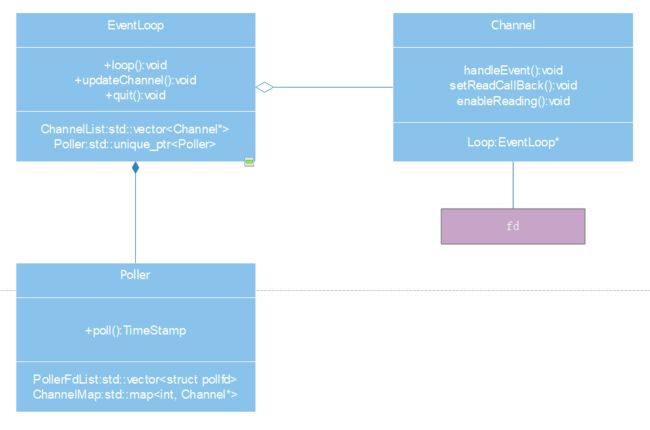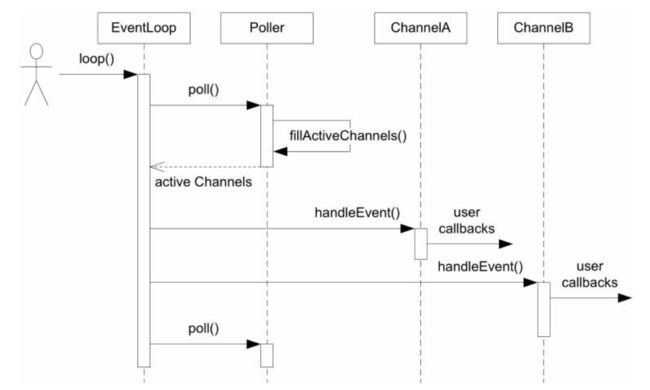目录
- muduo学习笔记(二)Reactor关键结构
- Reactor简述
- 什么是Reactor
- Reactor模型的优缺点
- poll简述
- poll使用样例
- muduo Reactor关键结构
- Channel
- Poller
- EventLoop
- Reactor时序图
- 测试程序-单次触发的定时器
- Reactor简述
muduo学习笔记(二)Reactor关键结构
Reactor简述
什么是Reactor
Reactor是一种基于事件驱动的设计模式,即通过回调机制,我们将事件的接口注册到Reactor上,当事件发生之后,就会回调注册的接口。
Reactor必要的几个组件:
Event Multiplexer事件分发器:即一些I/O复用机制select、poll、epoll等.程序将事件源注册到分发器上,等待事件的触发,做相应处理.
Handle事件源:用于标识一个事件,Linux上是文件描述符.
Reactor反应器:用于管理事件的调度及注册删除.当有激活的事件时,则调用回调函数处理,没有则继续事件循环.
event handler事件处理器:管理已注册事件和的调度,分成不同类型的事件(读/写,定时)当事件发生,调用对应的回调函数处理.
Reactor模型的优缺点
优点
1)响应快,不必为单个同步时间所阻塞,虽然Reactor本身依然是同步的;
2)编程相对简单,可以最大程度的避免复杂的多线程及同步问题,并且避免了多线程/进程的切换开销;
3)可扩展性,可以方便的通过增加Reactor实例个数来充分利用CPU资源;
4)可复用性,reactor框架本身与具体事件处理逻辑无关,具有很高的复用性;
缺点
Reactor模式在IO读写数据时还是在同一个线程中实现的,即使使用多个Reactor机制的情况下,那些共享一个Reactor的Channel如果出现一个长时间的数据读写,会影响这个Reactor中其他Channel的相应时间,比如在大文件传输时,IO操作就会影响其他Client的相应时间,因而对这种操作,使用传统的Thread-Per-Connection或许是一个更好的选择,或则此时使用Proactor模式。
poll简述
poll的使用方法与select相似,轮询多个文件描述符,有读写时设置相应的状态位,poll相比select优在没有最大文件描述符数量的限制.# include
int poll ( struct pollfd * fds, unsigned int nfds, int timeout);
struct pollfd {
int fd; /* 文件描述符 */
short events; /* 等待的事件 */
short revents; /* 实际发生了的事件 */
} ; 每一个pollfd结构体指定了一个被监视的文件描述符,可以传递多个结构体,指示poll()监视多个文件描述符。每个结构体的events域是监视该文件描述符的事件掩码,由用户来设置这个域。revents域是文件描述符的操作结果事件掩码,内核在调用返回时设置这个域。events域中请求的任何事件都可能在revents域中返回。合法的事件如下:
POLLIN 有数据可读。
POLLRDNORM 有普通数据可读。
POLLRDBAND 有优先数据可读。
POLLPRI 有紧迫数据可读。
POLLOUT 写数据不会导致阻塞。
POLLWRNORM 写普通数据不会导致阻塞。
POLLWRBAND 写优先数据不会导致阻塞。
POLLMSGSIGPOLL 消息可用。
poll使用样例
#include
#include
#include
#include
#include
#include
#include
#include
#define MAX_BUFFER_SIZE 1024
#define IN_FILES 1
#define MAX(a,b) ((a>b)?(a):(b))
int main(int argc ,char **argv)
{
struct pollfd fds[3];
char buf[1024];
int i,res,real_read, maxfd;
if((fds[0].fd=open("/dev/stdin",O_RDONLY|O_NONBLOCK)) < 0)
{
fprintf(stderr,"open data1 error:%s",strerror(errno));
return 1;
}
for (i = 0; i < IN_FILES; i++)
{
fds[i].events = POLLIN | POLLPRI;
}
while(1) //|| fds[1].events || fds[2].events)
{
int ret = poll(fds, 1, 1000);
if (ret < 0)
{
printf("Poll error : %s\n",strerror(errno));
return 1;
}
if(ret == 0){
printf("Poll timeout\n");
continue;
}
for (i = 0; i< 1; i++)
{
if (fds[i].revents)
{
memset(buf, 0, MAX_BUFFER_SIZE);
real_read = read(fds[i].fd, buf, MAX_BUFFER_SIZE);
if (real_read < 0)
{
if (errno != EAGAIN)
{
printf("read eror : %s\n",strerror(errno));
continue;
}
}
else if (!real_read)
{
close(fds[i].fd);
fds[i].events = 0;
}
else
{
if (i == 0)
{
buf[real_read] = '\0';
printf("%s", buf);
if ((buf[0] == 'q') || (buf[0] == 'Q'))
{
printf("quit\n");
return 1;
}
}
else
{
buf[real_read] = '\0';
printf("%s", buf);
}
}
}
}
}
exit(0);
} muduo Reactor关键结构
muduo Reactor最核心的事件分发机制, 即将IO multiplexing拿到的IO事件分发给各个文件描述符(fd)的事件处理函数。Channel
Chanel目前我对它的理解是,它负责管理一个文件描述符(file descript)IO事件.
Channel会封装C的poll事件,把不同的IO事件分发到不同的回调:ReadCallBack、WriteCallBack等
每个Channel对象自始至终只属于一个EventLoop,因此每个Channel对象都只属于某一个IO线程。 每个Channel对象自始至终只负责一个文件描述符(fd) 的IO事件分发
#ifndef NET_CHANNEL_H
#define NET_CHANNEL_H
#include
#include "EventLoop.hh"
class Channel {
public:
typedef std::function EventCallBack;
Channel(EventLoop* loop, int fd);
~Channel();
void handleEvent();
void setReadCallBack(const EventCallBack& cb) { m_readCallBack = cb; }
void setWriteCallBack(const EventCallBack& cb) { m_writeCallBack = cb; }
void setErrorCallBack(const EventCallBack& cb) { m_errorCallBack = cb; }
int fd() const { return m_fd; }
int events() const { return m_events; }
void set_revents(int revt) { m_revents = revt; }
bool isNoneEvent() const { return m_events == kNoneEvent; }
void eableReading() { m_events |= kReadEvent; update(); }
int index() { return m_index; }
void set_index(int idx) { m_index =idx; }
EventLoop* ownerLoop() { return m_pLoop; }
private:
Channel& operator=(const Channel&);
Channel(const Channel&);
void update();
static const int kNoneEvent;
static const int kReadEvent;
static const int kWriteEvent;
EventLoop* m_pLoop;
const int m_fd;
int m_events; // 等待的事件
int m_revents; // 实际发生了的事件
int m_index;
EventCallBack m_readCallBack;
EventCallBack m_writeCallBack;
EventCallBack m_errorCallBack;
};
#endif
//Channel.cpp
#include
#include "Channel.hh"
#include "Logger.hh"
const int Channel::kNoneEvent = 0;
const int Channel::kReadEvent = POLLIN | POLLPRI;
const int Channel::kWriteEvent = POLLOUT;
Channel::Channel(EventLoop* loop, int fd)
: m_pLoop(loop),
m_fd(fd),
m_events(0),
m_revents(0),
m_index(-1)
{
}
Channel::~Channel()
{
}
void Channel::update()
{
m_pLoop->updateChannel(this);
}
void Channel::handleEvent()
{
if(m_revents & POLLNVAL)
{
LOG_WARN << "Channel::handleEvent() POLLNVAL";
}
if(m_revents & (POLLERR | POLLNVAL)){
if(m_errorCallBack) m_errorCallBack();
}
if(m_revents & (POLLIN | POLLPRI | POLLRDHUP)){
if(m_readCallBack) m_readCallBack();
}
if(m_revents & POLLOUT){
if(m_writeCallBack) m_writeCallBack();
}
}
值得一提的就是 Channel::update()它会调用EventLoop::updateChannel(), 后者会转而调
用Poller::updateChannel()。Poller对象下面会讲,通过Poller::updateChannel()注册IO事件(即file descript).
Channel::handleEvent()是Channel的核心, 它由EventLoop::loop()调
用, 它的功能是根据revents发生事件的的值分别调用不同的用户回调。 这个函数以后还会扩充。
Poller
Poller class是IO multiplexing的封装。 它现在是个具体类,而在muduo中是个抽象基类,因为muduo同时支持poll(2)和epoll(4)两种IOmultiplexing机制。
Poller是EventLoop的间接成员,只供其自己在EventLoop的IO线程中调用,因此无须加锁。其生命期与EventLoop相等。
Poller并不拥有管理文件描述符事件的Channel, Channel在析构之前必须自己
unregister(EventLoop::removeChannel()) , 避免空悬指针
#ifndef _NET_POLLER_HH
#define _NET_POLLER_HH
#include
#include EventLoop
EventLopp在上一篇文章写过,这里给出改动.EventLoop 新增了quit()成员函数, 还加了几个数据成员,并在构造函数里初始化它们。注意EventLoop通过智能指针来间接持有poller.
+class Poller;
+class Channel;
class EventLoop
------------
bool isInloopThread() const {return m_threadId == CurrentThread::tid(); }
+void quit();
+void updateChannel(Channel* channel);
static EventLoop* getEventLoopOfCurrentThread();
private:
EventLoop& operator=(const EventLoop&);
EventLoop(const EventLoop&);
void abortNotInLoopThread();
+typedef std::vector ChannelList;
bool m_looping;
+bool m_quit;
const pid_t m_threadId;
+std::unique_ptr m_poller;
+ChannelList m_activeChannels;
};
//EventLoop.cpp
m_threadId(CurrentThread::tid()),
+ m_poller(new Poller(this))
{
------
+void EventLoop::quit()
+{
+ m_quit = true;
+ //wakeup();
+}
+
+void EventLoop::updateChannel(Channel* channel)
+{
+ assert(channel->ownerLoop() == this);
+ assertInLoopThread();
+ m_poller->updateChannel(channel);
+}
上一篇文章的EventLoop->loop()什么也没做,现在它有了实实在在的使命,它调用Poller::poll()获得当前活动事件的Chanel列表, 然后依次调用每个Channel的handleEvent()函数
void EventLoop::loop()
{
assert(!m_looping);
assertInLoopThread();
m_looping = true;
m_quit = false;
LOG_TRACE << "EventLoop " << this << " start loopig";
while(!m_quit)
{
m_activeChannels.clear();
m_poller->poll(1000, &m_activeChannels);
for(ChannelList::iterator it = m_activeChannels.begin();
it != m_activeChannels.end(); ++it)
{
(*it)->handleEvent();
}
}
LOG_TRACE << "EventLoop " << this << " stop loopig";
m_looping = false;
}Reactor时序图
测试程序-单次触发的定时器
程序利用timerfd_create 把时间变成了一个文件描述符,该“文件”在定时器超时的那一刻变得可读,这样就能很方便地融入到 select/poll 框架中,用统一的方式来处理 IO 事件和超时事件,这也正是 Reactor 模式的长处。
#include
#include
#include
#include "EventLoop.hh"
#include "Channel.hh"
#include "Poller.hh"
//Reactor Test
//单次触发定时器
#include
EventLoop* g_loop;
void timeout()
{
printf("timeout!\n");
g_loop->quit();
}
int main()
{
EventLoop loop;
g_loop = &loop;
int timerfd = ::timerfd_create(CLOCK_MONOTONIC, TFD_NONBLOCK |TFD_CLOEXEC);
Channel channel(&loop, timerfd);
channel.setReadCallBack(timeout);
channel.eableReading();
struct itimerspec howlong;
bzero(&howlong, sizeof howlong);
howlong.it_value.tv_sec = 3;
timerfd_settime(timerfd, 0, &howlong, NULL);
loop.loop();
close(timerfd);
}
./test.out
2018-10-31 22:25:54.532487 [TRACE] [EventLoop.cpp:16] [EventLoop] EventLoop Create 0x7FFEB9567CC0 in thread 3075
2018-10-31 22:25:54.533563 [TRACE] [Poller.cpp:64] [updateChannel] fd= 3 events3
2018-10-31 22:25:54.534000 [TRACE] [EventLoop.cpp:41] [loop] EventLoop 0x7FFEB9567CC0 start loopig
2018-10-31 22:25:54.534334 [TRACE] [Poller.cpp:20] [poll] Poller::poll()
2018-10-31 22:25:55.535827 [TRACE] [Poller.cpp:28] [poll] nothing happended
2018-10-31 22:25:55.536287 [TRACE] [Poller.cpp:20] [poll] Poller::poll()
2018-10-31 22:25:56.538334 [TRACE] [Poller.cpp:28] [poll] nothing happended
2018-10-31 22:25:56.538802 [TRACE] [Poller.cpp:20] [poll] Poller::poll()
2018-10-31 22:25:57.534175 [TRACE] [Poller.cpp:24] [poll] 1 events happended
timeout!
2018-10-31 22:25:57.534766 [TRACE] [EventLoop.cpp:55] [loop] EventLoop 0x7FFEB9567CC0 stop loopig

